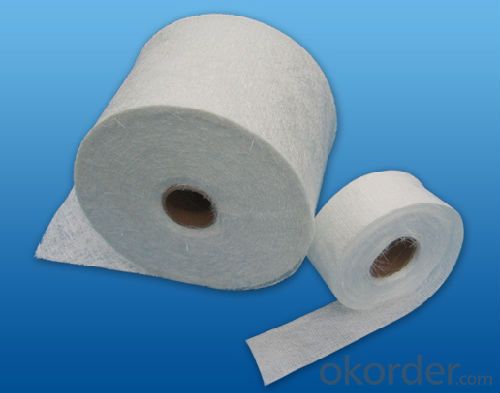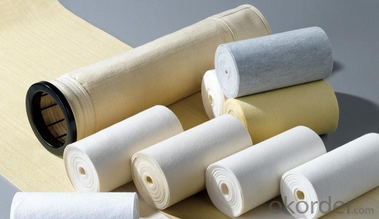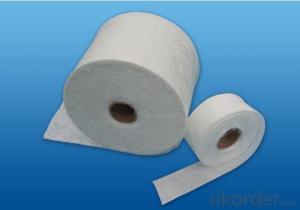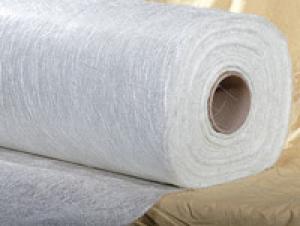FIBERGLASS STITCHED MAT 450g
OKorder Service Pledge
OKorder Financial Service
You Might Also Like
Structure of FIBERGLASS STITCHED MAT Description
The stitched mat is made of chopped strand which randomly dispersed and be stitched together by polyester thread. The width is available from 150-2400mm.Density of mat generally is 300-600g/m2.
The product is compatible with Polyester resin, vinyl ester resin, and epoxy resin.
Stitched mat is mostly primarily in pultrusion, RTM, filament winding, compression molding and hand lay up processes.
It is widely used in pipe lining, pultrusion section, storage tanks, FRP boat, insulation panel etc.
Main Features of FIBERGLASS STITCHED MAT
◎ Uniform thickness, good wet tensile strength retention.
◎ Good mould-ability, good drapability and easy operation.
◎ Good wet out speed and high efficiency in production.
FIBERGLASS STITCHED MAT Images


FIBERGLASS STITCHED MAT Specification:
Code | Density(g/m2) | Chopping layer density g/m2 | Width mm |
EMK225 | 225 | 225 | 150~2600 |
EMK250 | 250 | 250 | 150~2600 |
EMK300 | 300 | 300 | 150~2600 |
EMK450 | 450 | 450 | 150~2600 |
EMK600 | 600 | 600 | 150~2600 |
FAQ of FIBERGLASS STITCHED MAT
1. Why Choose us?
CNBM is a stated own company, provide the guarantee for the best quality, best service and safety business.
2. How will we guarantee the quality?
a, ISO 9001-2008 quality control system;
b, Strict and regular quality control in production;
c, Inspeciation when loading into container before shippment;
d, Sample stock for one year for quality tracing and record.
3. What is your MOQ?
Our MOQ is one pallet.
4. Can you provide sample?
Yes, samples are in stock. we can offer free sample for you.
5. Payment terms?
We can accept L/C, T/T etc.
6. Do you offer OEM service?
Yes, we can print customers’ logo on the packaging;
And the size and specification can be produced and design according to your demand.
- Q:Is fiberglass mat tissue resistant to UV degradation?
- Fiberglass mat tissue is generally resistant to UV degradation to some extent. However, its level of resistance may vary depending on the specific type and quality of the fiberglass mat tissue. UV degradation occurs when prolonged exposure to ultraviolet (UV) radiation from the sun causes the degradation of materials. This degradation can lead to discoloration, brittleness, and reduced strength in the material. Fiberglass mat tissue is often manufactured with additives and coatings that provide some level of UV resistance. These additives and coatings help to protect the fibers from the damaging effects of UV radiation. However, it is important to note that the level of UV resistance can vary between different manufacturers and products. To ensure maximum UV resistance, it is recommended to choose fiberglass mat tissue that is specifically designed for outdoor applications and has been tested for UV stability. Additionally, proper maintenance and periodic inspections can help to identify any signs of UV degradation and allow for timely repairs or replacements if necessary.
- Q:How does the width of fiberglass mat tissue affect its installation?
- The width of fiberglass mat tissue affects its installation by determining the amount of coverage it provides per roll. A wider mat tissue will cover a larger area with each roll, reducing the number of rolls needed for installation. This can save time and effort during the installation process. Additionally, a wider width may also provide better overall strength and stability to the installed fiberglass mat tissue.
- Q:What are the different quality standards for fiberglass mat tissue?
- There are several quality standards for fiberglass mat tissue, including weight per unit area, tensile strength, elongation, tear resistance, and moisture content. These standards ensure that the fiberglass mat tissue meets certain performance criteria and can be used effectively in various applications such as roofing, insulation, and composite materials.
- Q:Is fiberglass mat tissue suitable for insulation in data centers?
- Insulation in data centers can be achieved using fiberglass mat tissue, which is commonly utilized for thermal and acoustic purposes. This type of fiberglass insulation has numerous benefits, including high thermal resistance, fire resistance, and sound absorption capabilities. Maintaining a controlled and stable environment for sensitive electronic equipment is crucial in data centers, and insulation plays a vital role in achieving this. Fiberglass mat tissue can effectively reduce heat transfer, prevent hot spots, and maintain the desired temperature levels within the data center. Additionally, it contributes to noise reduction, creating a comfortable working environment for personnel. However, before determining the suitability of fiberglass mat tissue for data center insulation, certain factors need to be considered. Thorough evaluation of the data center's specific requirements for thermal insulation, fire resistance, and acoustic control is necessary. The installation process and maintenance requirements should also be assessed to ensure effective implementation and upkeep of the insulation material. It is important to explore alternative insulation options, such as mineral wool, foam insulation, or specialized materials that may better meet the unique demands of data centers. These materials may offer advantages like enhanced fire resistance, moisture control, or improved thermal efficiency. Ultimately, determining the suitability of fiberglass mat tissue for data center insulation requires a comprehensive evaluation of specific needs, regulatory requirements, and available options. Seeking the expertise of professionals in data center construction and insulation can provide valuable insights and aid in making an informed decision.
- Q:Can fiberglass mat tissue be used for roofing applications?
- Certainly, roofing applications can utilize fiberglass mat tissue. This lightweight and flexible material finds widespread use in the construction industry for a multitude of purposes, with roofing being one of them. It serves as a reinforcement layer, bolstering the strength and durability of roofing systems. Typically, the fiberglass mat tissue is saturated with bitumen or other waterproofing substances to establish a water-resistant shield atop the roof. Additionally, it contributes to augmenting the fire resistance and thermal insulation characteristics of the roof. Furthermore, fiberglass mat tissue's resistance to mold, mildew, and other prevalent roofing problems makes it an excellent option for roofing applications.
- Q:Is fiberglass mat tissue resistant to termites and insects?
- Generally, termites and insects do not pose a threat to fiberglass mat tissue. This is because fiberglass is made from woven glass fibers, which are not a preferred food source for termites or insects. Furthermore, a layer of resin is typically applied to fiberglass mat tissue, further enhancing its resistance to pests. As a result, fiberglass mat tissue is a popular choice for construction and insulation in areas prone to termite and insect infestations. However, it is important to note that although fiberglass mat tissue itself is resistant to termites and insects, it does not provide complete protection against infestations. Therefore, it is advisable to implement additional measures such as proper sealing and regular inspections to ensure effective long-term pest control.
- Q:How does the thickness of fiberglass mat tissue affect its performance?
- The performance of fiberglass mat tissue is greatly influenced by its thickness. Thicker mat tissues generally offer superior strength and durability compared to thinner ones. When the mat tissue is thicker, there is a higher proportion of resin to glass, resulting in increased stiffness and toughness. This higher resin content improves the overall structural integrity and mechanical properties of the mat tissue, reducing the risk of delamination and enhancing resistance to impact and fatigue. Furthermore, thicker fiberglass mat tissues are more effective in providing thermal and acoustic insulation. The increased thickness allows for a greater concentration of fibers, enhancing the material's ability to trap air and reduce heat transfer or sound transmission. However, it is important to consider the specific application and requirements when determining the appropriate thickness of fiberglass mat tissue. While thicker tissues generally offer better performance, they may also be heavier and more costly. Therefore, it is crucial to strike a balance between the desired performance characteristics and practical considerations such as weight, cost, and ease of installation.
- Q:Can fiberglass mat tissue be used for electrical insulation?
- Fiberglass mat tissue can indeed serve as electrical insulation due to its impressive properties. Composed of fine glass fibers, this non-woven fabric possesses exceptional electrical insulation capabilities. Its ability to endure high temperatures and exhibit a high dielectric strength renders it ideal for a range of electrical applications. For instance, it finds regular use as an insulation material in electrical transformers, motors, generators, and other electrical equipment. By creating a barrier that hinders the passage of electrical current, the fiberglass mat tissue safeguards the components against potential electrical shocks or short circuits. Moreover, it boasts resistance against moisture, chemicals, and UV radiation, thereby further enhancing its suitability for electrical insulation purposes.
- Q:Can fiberglass mat tissue be used for electrical enclosures?
- Typically, fiberglass mat tissue is not employed in the construction of electrical enclosures. These enclosures are specifically designed to shield electrical equipment against external elements including dust, moisture, and physical harm. Usually, materials with excellent insulation and high mechanical strength, such as sheet metal, plastic, or fiberglass reinforced plastic (FRP), are used for their manufacture. Although fiberglass mat tissue can offer certain levels of mechanical strength and insulation, it is not commonly utilized as the main material for electrical enclosures due to its restricted durability and lower resistance to moisture and impact.
- Q:How does fiberglass mat tissue perform in terms of moisture absorption?
- Fiberglass mat tissue performs exceptionally well in terms of moisture absorption. Due to its composition of fine fibers, it has a high surface area which enables it to quickly absorb moisture. Additionally, fiberglass mat tissue is hydrophobic, meaning it repels water and does not retain moisture for extended periods. This characteristic makes it an ideal material for applications where moisture resistance is crucial, such as in the construction of waterproofing membranes or in the manufacturing of boats and water tanks. Overall, fiberglass mat tissue demonstrates excellent performance in preventing moisture absorption and maintaining its structural integrity even in wet environments.
1. Manufacturer Overview |
|
|---|---|
| Location | |
| Year Established | |
| Annual Output Value | |
| Main Markets | |
| Company Certifications | |
2. Manufacturer Certificates |
|
|---|---|
| a) Certification Name | |
| Range | |
| Reference | |
| Validity Period | |
3. Manufacturer Capability |
|
|---|---|
| a)Trade Capacity | |
| Nearest Port | |
| Export Percentage | |
| No.of Employees in Trade Department | |
| Language Spoken: | |
| b)Factory Information | |
| Factory Size: | |
| No. of Production Lines | |
| Contract Manufacturing | |
| Product Price Range | |
Send your message to us
FIBERGLASS STITCHED MAT 450g
OKorder Service Pledge
OKorder Financial Service
Similar products
New products
Hot products
Hot Searches
Related keywords



























